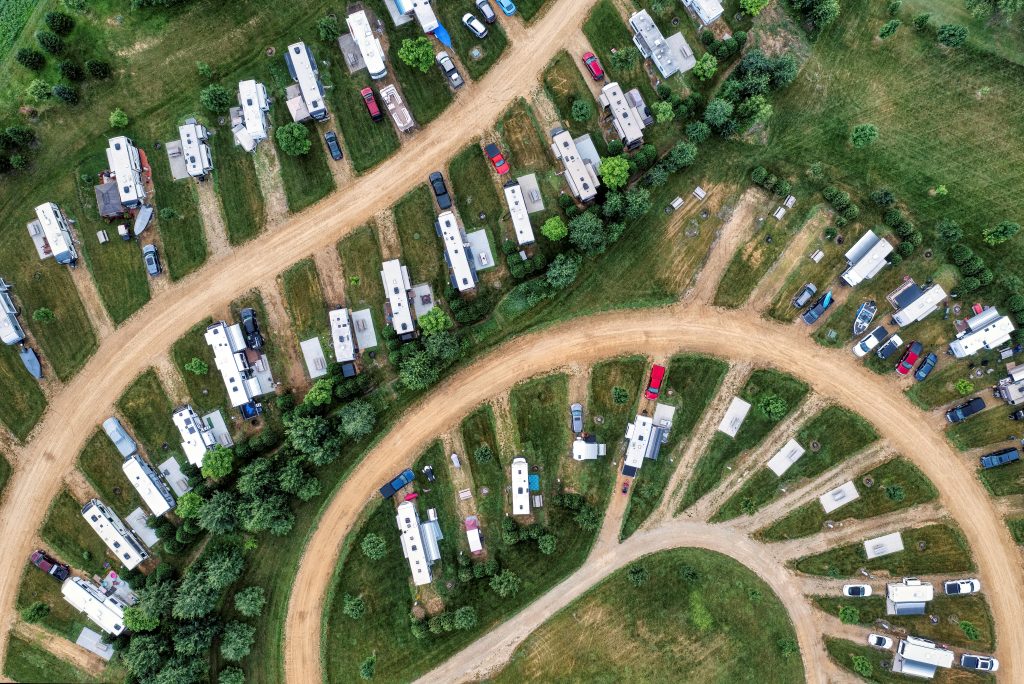
Tampa, FL, August 8th, 2025 –Written by Nick Cannella
With more people than ever seeking affordable travel, flexible lifestyles, and time in nature, Florida is experiencing a surge in demand for RV parks and campgrounds. From retirees hitting the road full-time to families opting for weekend getaways, recreational vehicle (RV) living isn’t just a trend—it’s a booming real estate opportunity.
For landowners, this opens the door to a critical question: Could your land be the next RV park or campground development site?
At Eshenbaugh Land Company, we’re seeing increased interest from developers, private investors, and outdoor hospitality operators looking for land across Florida to serve this growing market. In this article, we’ll walk through what makes a property a good fit for RV park use—and how you, as a landowner, can determine whether now is the right time to sell.
Why RV Parks Are on the Rise in Florida
Florida has long been a popular destination for RVers, but a few 2025-specific factors are accelerating the trend:
- Population growth & tourism rebound
- Housing affordability challenges—some people are choosing RVs as a primary residence
- Increased demand for nature-focused experiences
- Remote work flexibility
- A growing number of RV rentals and sales nationwide
These trends have pushed private equity firms, hospitality groups, and niche developers to expand or build new RV parks—especially in Florida, which offers year-round usability, diverse landscapes, and strong consumer demand.
What Makes Land a Good Fit for an RV Park or Campground?
If you’re considering selling your land, understanding what RV developers are looking for is key. Here are the most important criteria:
1. Location and Accessibility
- Close proximity to interstates, highways, or major tourist corridors
- Within driving distance of natural attractions, beaches, springs, state parks, or major cities
- Easy ingress/egress for RVs—flat roads, wide entrances, and minimal grade changes
2. Size and Layout
- Most developers prefer 5 to 30 acres, but larger tracts offer more flexibility
- Land should be relatively flat and cleared for easier infrastructure installation
- A rectangular or square layout is often preferred for efficient lot design
3. Zoning and Land Use
- Zoning should allow for commercial recreation, RV parks, or campgrounds
- Future Land Use (FLU) compatibility is critical, especially in counties like Polk, Pasco, Hernando, and Marion
- If zoning is not currently compatible, the property should have potential for rezoning or conditional use approval
4. Utilities and Infrastructure
- Access to electric, septic or sewer, and well or public water
- Broadband internet availability is now a bonus, especially for long-term RVers
- Permits for wastewater and stormwater management will be needed
5. Environmental Considerations
- Minimal wetlands or flood zones
- Good drainage and soil composition
- Not within protected wildlife corridors or conservation overlays
Florida Regions Drawing RV Developer Interest in 2025
While RV parks are being considered statewide, some Florida counties are especially attractive to investors and operators right now:
- Polk County – Central location between Tampa and Orlando; near I-4 corridor
- Marion County – Proximity to Ocala, springs, and equestrian tourism
- Pasco & Hernando Counties – Growing residential population and close to Gulf beaches
- Lake & Citrus Counties – Ideal for nature-based camping and RV retreats
- North Florida Counties – More affordable land for long-term seasonal parks or glamping resorts
What’s My Land Worth to an RV Developer?
RV park developers and investors typically evaluate land based on:
- Cost per usable acre
- Estimated number of pads or lots that can be built
- Permitting timeline and difficulty
- Surrounding competition and demand
Land near popular state parks, beaches, or major highways may command premium pricing, especially if zoning is already aligned. In other cases, an RV use may help unlock value on a property with limited residential density.
How to Know if Your Land is a Fit
At Eshenbaugh Land Company, we use advanced GIS tools, zoning research, and buyer outreach to help landowners understand their property’s potential for RV park development.
We evaluate:
- Zoning and FLU compatibility
- Proximity to infrastructure and tourism drivers
- Environmental constraints
- Current buyer demand in your area
Even if your property isn’t zoned for recreational use today, we can advise whether pursuing a conditional use permit or entitlement strategy could boost its appeal and value.
As the RV lifestyle continues to grow, developers are actively looking for land across Florida to meet demand. If you’ve been holding land that’s flat, cleared, and near travel corridors or nature-based amenities, you may be sitting on a perfect opportunity.
RV parks aren’t just a passing fad—they’re becoming a permanent fixture in the outdoor hospitality sector. And that means new possibilities for landowners ready to explore their options.
📞 Wondering if Your Florida Land Could Be an RV Park? Let’s Talk.
Call us at (813) 287-8787 or visit www.thedirtdog.com to speak with one of our land experts today. We’ll help you evaluate your property and connect you with the right buyer—whether that’s a national RV operator, private investor, or local developer.
